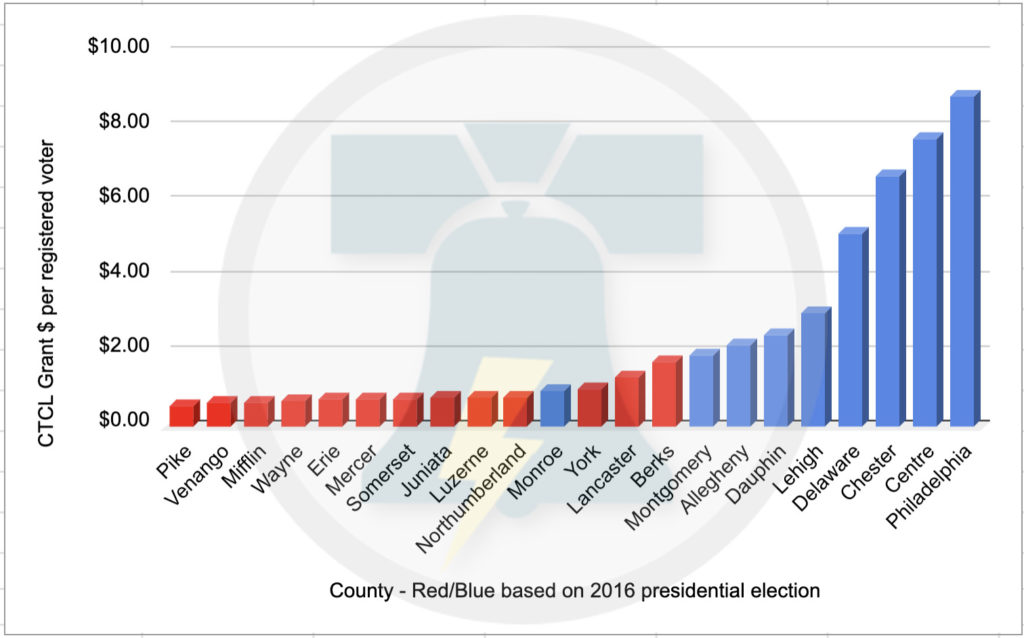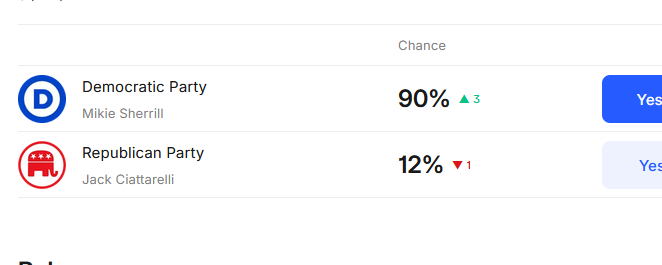Zuckerberg-funded 2020 election grants skewed heavily toward PA’s ‘blue’ counties
Grant monies awarded to help fund the 2020 election in at least 21 different Pennsylvania counties were heavily skewed toward counties with high Democratic registration and recent voting turnout, an analysis from Broad + Liberty shows.
Pennsylvania Republicans are currently considering legislation that would change the rules for private grants such as these in future elections, requiring them to go directly to the Pa. Department of State to be distributed evenly. Similar bills have been passed in Georgia and Arizona and are being considered in other states.
The funds came from the nonprofit Center for Tech and Civic Life, founded in 2015. The CTCL drew national attention in the runup to the 2020 election after Facebook founder Mark Zuckerberg and his wife Priscilla Chan gave $250 million to the nonprofit, according to a CTCL press release from September. A month later, the couple donated another $100 million to CTCL.
Approximately $22 million in total was granted from CTCL to Pennsylvania counties.
Pennsylvania Republicans were skeptical and sometimes irate with the grants, claiming that the nonprofit was buying election infrastructure to help propel Democratic turnout in a state that nearly all agreed would be essential to winning the Electoral College.
Rep. Jim Struzzi (R-Indiana County), a sponsor of the Pennsylvania bill, asserted in a The Center Square article that CTCL’s actions may violate the 14th amendment because “all eligible voters must be given equal access to their right to vote.” Allowing grants to some counties and not others is unfair, he said.
Democrats, and even a judge who heard a complaint on the matter, rebuffed these claims by pointing to grants given by CTCL to some counties in the commonwealth that had voted for Trump by a 2-to-1 margin in 2016.
But while it is true that the CTCL gave grants to “red” counties like Luzerne, Erie and Mifflin, those grants were a fraction of what was given to bluer counties, especially in the southeast.
For example, Luzerne County received a grant of just over $173,000, averaging out 78 cents per registered voter. Erie County’s grant of $148,729 came to 73 cents per registered voter.
Meanwhile, Philadelphia and the collar counties enjoyed grants several times larger.
Delaware County’s grant of $2.2 million boosted election spending by $5.17 per registered voter, while Chester County’s $2.5 million averaged $6.57 per registered voter. These suburban collar counties were essential to flipping the state of Pennsylvania, even as Republicans increased their vote counts in Philadelphia itself.

On a raw dollars basis, both Chester and Delaware received more from their respective grants than the total doled out to all of the “red” counties combined.
Meanwhile, the $10 million and change granted to Philadelphia came to an astonishing $8.87 to spend per registered voter — roughly 12 times more than the per-voter award to Luzerne or Erie counties. Philadelphia’s grant was five times larger than the largest “red” county grant.
Broad + Liberty is still waiting on grant documentation from Armstrong County and will update the story and the graphic when that information is received.
All grant award amounts are based on documents obtained via Right to Know request by Broad + Liberty, or were obtained by the Foundation for Government Accountability, a Washington D.C.-based nonprofit. Voter registration numbers were based on statistics available from the Pennsylvania Department of State on November 2, 2020.
“We must put a stop to private money election grants to cities and counties,” said Rep. Eric Nelson, (R-Westmoreland). “Big tech significantly outspent government in selective areas resulting in a dangerous precedent for all future elections. I fought this before the election and will continue to battle tactics that result in the unequal treatment of voters.”
A request for comment to CTCL was not returned.
While it is true that the CTCL gave grants to “red” counties like Luzerne, Erie and Mifflin, those grants were a fraction of what was given to bluer counties, especially in the southeast.
The Thomas Moore Society filed suit against many of the blue counties before the election.
“Phill Kline, the man leading the legal charge, insisted local officials can’t accept those grants and that the money was flowing to areas where ‘progressive’ voters are numerous, leaving out conservatives,” reported Chris Brennan for the Philadelphia Inquirer.
“[U.S. District Judge Matthew W.] Brann pointed to a serious flaw in that logic with his ruling [in October]. CTCL has given grants to 18 Pennsylvania counties, 11 of which supported Trump for president four years ago. Five of those counties backed Trump by a margin of two to one,” the Inquirer report concluded.
Rep. Seth Grove (R-York County), who also supports the bill that would restrict these kinds of grants, said the disproportionate amounts were striking.
“I don’t think anybody would disagree that Philly would get substantially more money than some of these counties. But proportionally, it appears to look as though some red counties were patted on the head and said, ‘Oh, here you go’ to say that money went to red and blue counties combined,” Grove said.
Gov. Wolf’s spokeswoman, Lyndsay Kensinger, told another outlet that the governor is opposed to the legislation.
“The CTCL funding last year was used for non-partisan purposes, including most importantly purchasing protective equipment that helped keep poll workers safe in an unprecedented election year,” she said. “Instead of making it more difficult for the counties to obtain resources they need to administer elections, we should focus our efforts on commonsense election improvements such as allowing pre-canvassing of ballots, which is supported by the state county commissioners association and all 67 counties,” she said.
A portion of the Philadelphia CTCL grants used to fund “satellite election offices” also drew controversy and a lawsuit in the runup to the November vote. The issue gained instant notoriety when President Trump referred to them by saying “Bad things happen in Philadelphia” in the first presidential debate.
The city spent $2.2 million of the CTCL grants on satellite offices spread throughout the city that could register a voter, give them an absentee ballot, and accept the ballot back all at the same spot.
A small number of people claiming to be Trump poll watchers attempted to gain access to the offices but were denied, which spurred Trump’s comments at the debate. The city claimed the locations were not early voting centers, but instead were duplications of the main election office in City Hall, and thus weren’t open to poll watchers.
The Trump campaign sued to try and force access for poll watchers, but lost in a 2-1 decision in Commonwealth Court.
At least two of the grant request submissions (from Lehigh and Mifflin) show that the counties did not request a specific dollar figure from the CTCL, but instead were leaving the grant award to be decided by the nonprofit. Those grant submissions show that the counties mainly supplied the CTCL with the number of registered voters they served, and what the counties’ budgets were for that year.
Reports have varied as to the number of counties that have accepted grants from CTCL, but below is a list of all the counties that accepted a grant, as listed in a spreadsheet from CTCL. If a county has a hyperlink it will take you to grant documents obtained by Broad + Liberty.
Allegheny; Armstrong; Berks; Centre; Chester; Dauphin; Delaware; Erie; Juniata; Lancaster; Lehigh; Luzerne; Mercer; Mifflin; Monroe; Montgomery; Northumberland; Philadelphia; Pike; Somerset; Venango; Wayne; York.
Update: The original version of this story did not have data from Montgomery County in the graph. That information has been added.
Todd Shepherd is Broad + Liberty’s chief investigative reporter. Send him tips at tshepherd at broadandliberty.com, or use his encrypted email at shepherdreports at protonmail.com.



